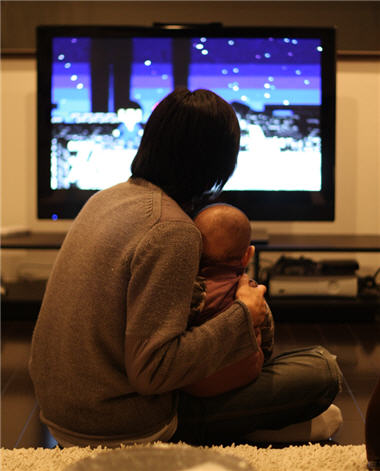Was Sesame Street a gateway drug?

Two days ago, the the American Academy of Pediatrics put out a press release with a policy statement recommending that parents limit children under two to very small amounts of exposure to media screens.

The survey also revealed that parents who consider educational television to be "very important for healthy development" are twice as likely to keep the TV on all or most of the time. All the time? Really? Who knew Sesame Street was a gateway drug?
What do I mean by gateway drug? I don't mean to pick on Sesame Street in particular (especially since I adored it as a preschooler), but that show and others like it it did open the door for TV as edutainment, and probably fueled the popular, misguided belief that if some TV is a good thing, all TV must be good, so more TV is even better, and start 'em younger, and if the kids are quiet, why that's best of all!
I suppose it's not really fair for me to judge. I mean -- I've figured out that if I park my 50-year-old husband in front of Netflix streaming old StarTrek episodes (currently he's halfway through season 4 of TNG), I can safely leave him unattended for hours on end, especially if I strategically place some snacks close by.
As an amusing aside, I was flabbergasted to find out that the Sesame Street DVD set containing the episodes many of us grew up with are now considered inappropriate for children. Google it. I'm not kidding. Go figure.
In all seriousness, though, the American Association of Pediatrics Council on Communications and Media set out to explore and report upon whether video and TV programs have any educational value for children under two, or whether they actually cause harm.
You can read about the key findings in the PDF press release, but the general gist is that our little ones need to interact directly with their environment in unstructured play in order to learn how the world works, and they need to bond with live people who are paying attention to them (which they can't do if we're wrapped up in our favorite shows (which they can't really understand the context and content of anyhow).
Worst of all, TV viewing can negatively affect their sleep habits, mood, and language development, and distracts them from the kind of learning that can help them the most.
If you want to learn more about the AAP policy statement, you can keep an eye out for the full report, which will be published online in the November 2011 issue of Pediatrics, the official journal of the American Association of Pediatrics.
Photo courtesy of Flickr user iandeth.
What do you think of the electronic babysitter? Share in the TalkBacks below.